雅思口语试讲
- 格式:pptx
- 大小:628.72 KB
- 文档页数:10

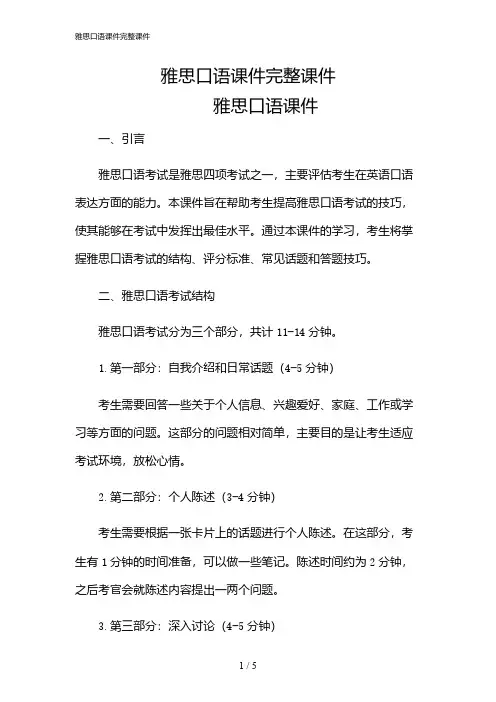
雅思口语课件完整课件雅思口语课件一、引言雅思口语考试是雅思四项考试之一,主要评估考生在英语口语表达方面的能力。
本课件旨在帮助考生提高雅思口语考试的技巧,使其能够在考试中发挥出最佳水平。
通过本课件的学习,考生将掌握雅思口语考试的结构、评分标准、常见话题和答题技巧。
二、雅思口语考试结构雅思口语考试分为三个部分,共计11-14分钟。
1.第一部分:自我介绍和日常话题(4-5分钟)考生需要回答一些关于个人信息、兴趣爱好、家庭、工作或学习等方面的问题。
这部分的问题相对简单,主要目的是让考生适应考试环境,放松心情。
2.第二部分:个人陈述(3-4分钟)考生需要根据一张卡片上的话题进行个人陈述。
在这部分,考生有1分钟的时间准备,可以做一些笔记。
陈述时间约为2分钟,之后考官会就陈述内容提出一两个问题。
3.第三部分:深入讨论(4-5分钟)考官会就第二部分的话题进行更深入的讨论,提问一些与话题相关的问题。
这部分的问题较为抽象,需要考生具备一定的思维能力和语言组织能力。
三、雅思口语评分标准1.流利性与连贯性:考生能否顺畅地表达自己的观点,是否能够使用恰当的连接词使句子连贯。
2.词汇资源:考生能否使用丰富的词汇表达自己的观点,是否能够使用一些不常见的词汇。
3.语法范围与准确性:考生能否使用多种语法结构,是否能够正确地使用语法。
4.发音:考生的发音是否清晰,是否能够使用自然的语调。
四、雅思口语常见话题1.个人信息:姓名、年龄、家乡、工作或学习等。
2.兴趣爱好:运动、音乐、电影、旅行等。
3.家庭与朋友:家庭成员、朋友关系、节假日活动等。
4.工作与学习:工作职责、学习经历、学校设施等。
5.日常生活:生活习惯、交通方式、购物等。
6.旅游:旅行经历、理想中的旅行目的地、旅行中的困难等。
7.未来规划:职业规划、留学计划等。
五、雅思口语答题技巧1.第一部分:简短回答,保持流利。
尽量避免长时间的停顿和重复。
2.第二部分:条理清晰,观点明确。

环球雅思口语试讲
在环球雅思的口语试讲里,就像走进了一个超级有趣的英语小世界。
那里的老师可好了,就像我们的好朋友一样。
我给你们讲个故事吧。
有个小朋友叫小明,他一开始特别害怕说英语,一开口就紧张得不行。
但是他去参加了环球雅思的口语试讲。
试讲的老师一见到他,就满脸笑容地跟他打招呼,用很简单的英语问他今天过得怎么样。
小明有点害羞地回答了。
老师就像发现了宝藏一样,大声地说:“你说得很棒呢!”这让小明一下子就放松了不少。
在试讲的课堂上,老师不会讲那些很难懂的东西。
比如说,要教我们描述自己的家庭。
老师不会直接说语法规则,而是先让大家想一想自己的家人。
老师会说:“想想你们的爸爸妈妈,他们长什么样子呀?是高高的,还是矮矮的?是胖胖的,还是瘦瘦的?”然后老师会示范说:“My father is tall and strong. He has big eyes.”这样,小朋友们就很容易跟着说了。
像小明,他就说:“My mother is kind. She has long hair.”老师就会给他鼓掌,还会给他一个小贴纸作为奖励。
而且呀,试讲的教室里布置得也很温馨。
墙上有很多漂亮的英语单词卡片,还有一些可爱的小动物图片,旁边写着它们的英文名字。
这样小朋友们一抬头就能看到,随时都能学习。
就像有一次,一个小朋友看到墙上的“cat”这个单词,旁边是一只超级可爱的小花猫图片,他就跟老师说:“I like cats.”然后老师就顺势和他聊起了猫的各种事情,像猫会抓老鼠,猫喜欢晒太阳之类的。

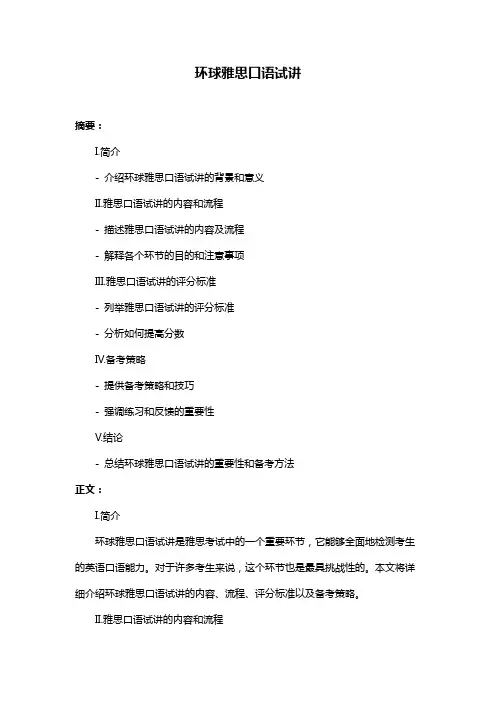
环球雅思口语试讲摘要:I.简介- 介绍环球雅思口语试讲的背景和意义II.雅思口语试讲的内容和流程- 描述雅思口语试讲的内容及流程- 解释各个环节的目的和注意事项III.雅思口语试讲的评分标准- 列举雅思口语试讲的评分标准- 分析如何提高分数IV.备考策略- 提供备考策略和技巧- 强调练习和反馈的重要性V.结论- 总结环球雅思口语试讲的重要性和备考方法正文:I.简介环球雅思口语试讲是雅思考试中的一个重要环节,它能够全面地检测考生的英语口语能力。
对于许多考生来说,这个环节也是最具挑战性的。
本文将详细介绍环球雅思口语试讲的内容、流程、评分标准以及备考策略。
II.雅思口语试讲的内容和流程雅思口语试讲通常分为三个部分:简介、主题陈述和问答环节。
在简介部分,考生需要用英语自我介绍,包括姓名、年龄、职业等基本信息。
在主题陈述部分,考生需要准备一个与雅思考试主题相关的话题,并进行2 到3 分钟的陈述。
在问答环节,考官会针对考生的陈述提出一些问题,考生需要回答这些问题。
III.雅思口语试讲的评分标准雅思口语试讲的评分标准主要包括:语法准确性、词汇丰富度、语言流畅性、发音和连贯性。
语法准确性指的是考生在使用英语时,能否正确地使用语法规则。
词汇丰富度指的是考生能否使用不同的词汇和表达方式来表达自己的想法。
语言流畅性指的是考生能否流利地使用英语进行表达。
发音指的是考生的发音是否准确、清晰。
连贯性指的是考生能否将不同的句子和段落有机地连接起来,形成一个完整的故事或观点。
IV.备考策略为了在雅思口语试讲中取得好成绩,考生需要进行充分的备考。
首先,考生需要了解雅思口语试讲的内容和流程,以便在考试时能够清楚知道下一步该做什么。
其次,考生需要练习自己的英语口语能力,包括语法准确性、词汇丰富度、语言流畅性和发音。
最后,考生需要不断地练习和获得反馈,以便了解自己的进步和改进方向。
V.结论总的来说,环球雅思口语试讲是一个非常重要的考试环节,它能够全面地检测考生的英语口语能力。

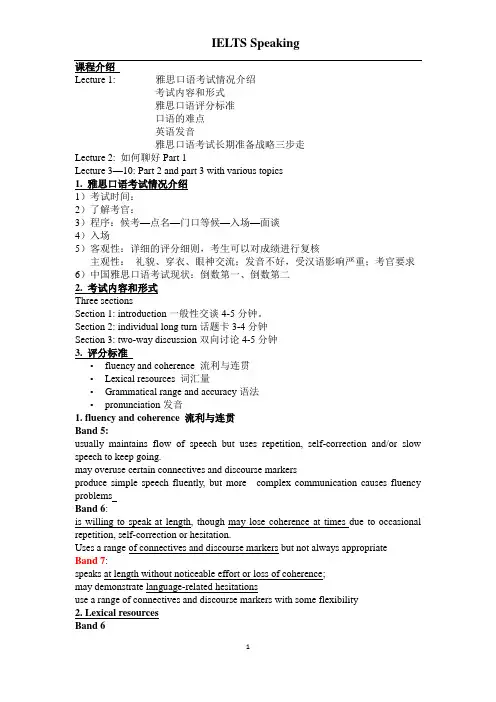
课程介绍Lecture 1: 雅思口语考试情况介绍考试内容和形式雅思口语评分标准口语的难点英语发音雅思口语考试长期准备战略三步走Lecture 2: 如何聊好Part 1Lecture 3—10: Part 2 and part 3 with various topics1. 雅思口语考试情况介绍1)考试时间:2)了解考官:3)程序:候考—点名—门口等候—入场—面谈4)入场5)客观性:详细的评分细则,考生可以对成绩进行复核主观性:礼貌、穿衣、眼神交流;发音不好,受汉语影响严重;考官要求6)中国雅思口语考试现状:倒数第一、倒数第二2. 考试内容和形式Three sectionsSection 1: introduction一般性交谈4-5分钟。
Section 2: individual long turn话题卡3-4分钟Section 3: two-way discussion双向讨论4-5分钟3. 评分标准•fluency and coherence 流利与连贯•Lexical resources 词汇量•Grammatical range and accuracy语法•pronunciation发音1. fluency and coherence 流利与连贯Band 5:usually maintains flow of speech but uses repetition, self-correction and/or slow speech to keep going.may overuse certain connectives and discourse markersproduce simple speech fluently, but more complex communication causes fluency problemsBand 6:is willing to speak at length, though may lose coherence at times due to occasional repetition, self-correction or hesitation.Uses a range of connectives and discourse markers but not always appropriateBand 7:speaks at length without noticeable effort or loss of coherence;may demonstrate language-related hesitationsuse a range of connectives and discourse markers with some flexibility2. Lexical resourcesBand 6Has a wide enough vocabulary to discuss topics at length and make meaning clear in spite of inappropriacies.Generally paraphrases successfullyBand 7Uses vocabulary resource flexibly to discuss a variety of topics;Uses some less common and idiomatic vocabulary and shows some awareness of style and collocation with some inappropriate choices.Uses paraphrase effectively3.Grammatical range and accuracyBand 6:Uses a mix of simple and complex structures, but with limited flexibility.May make frequent mistakes with complex structures, though these rarely cause comprehension problems.Band 7:use a range of complex structures with some flexibilityFrequently produces error-free sentences, though some grammatical mistakes persists 4. PronunciationBand 5: 能听懂,但需要仔细辨认Band 6can generally be understood throughout, though mispronunciation of individual words or sounds reduces clarity at times.Band 8Uses a wide range of pronunciation features;sustains flexible use of features, only with occasional lapses;is easy to understand throughout; L1 accent has minimal effect on intelligibility Band 7shows all the positive features of band 6 and some, but not all, the positive features of band 8.4. 口语的难点1)回答问题很被动2)表情、眼神3)地道的汉语式英语:犹豫;词尾是辅音时4)发音:咬舌音、卷舌音不管有没有r,都卷舌头5)语法:he/she不分5. 英语发音注意事项:1)发音位置靠后2)长元音和双元音饱满,单元音短促有力Mike likes to write by the nice bright light at night; Macao came back to China in 1999; I like the shape of the mountain.3)咬舌音there are thirty-three thousand three hundred and thirty-three feathers on the bird’s throat.4)易混淆的音[l], [r] well—wear; we’re terribly sorry for being late[l] 舌尖抬起,抵住齿龈根部,舌面凹,舌后部微抬,气流从舌边流出。

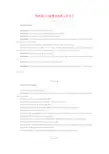
雅思强化口语精讲班第4讲讲义FilmExercise 6: FilmExaminer: What kind of films do you like?Candidate: I like foreign films, especially the Hollywood films.Examiner: Do you often go to cinemas to watch a film?Candidate: No, I rarely go to cinema because tickets are expensive nowadays. I borrow or buy VCD and watch the film at home.What’s the difference between watching films in the cinema and at home?Well, the sound effect is better in the cinema, and the screen is larger, but the audience can’t comment on the content freely. If we stay at home, we can talk about the plot any time.Examiner: What kind of films do you like best?Candidate: I like horror films. They are exciting and thrilling. I like the feeling of watching this kind of film.Examiner: Do you watch it by yourself or with your family?Candidate: It depends. But most of time I watch by myself because they don’t like it. They think it’s too scary.ShoppingExercise 6: ShoppingInterviewer: Do you like shopping?Candidate: Not really. I believe it is a waste of time, and I just go shopping when I need to buy some daily necessities.Interviewer: Who do you go shopping with?Candidate: I go shopping with my friends. I ask them for advice.Interviewer: How often do you go shopping?Candidate: I go shopping every two weeks. I take the bus to the supermarket nearby.Interviewer: What do you like to buy?Candidate: I buy sportswear, shoes or snacks like yogurt or sunflower seeds. They are my favorite.Interviewer: Where do you like to go shopping?Candidate: There is a supermarket called Peace Plaza near my home and I can walk there.Interviewer: Who does most shopping in your family?Candidate: My mother does most shopping, and she buys food, drinks, shampoo nearly every week.Interviewer: What department stores are there?Candidate: There is a large shopping mall. People can buy whatever they want.ReadingExercise 7: ReadingInterviewer: Do you like reading?Candidate: Well, yes. I like reading very much.Interviewer: Why do you like reading?Candidate: I like reading because I can get a lot of new information from books. I will know what life is like.Interviewer: What kind of books do you read?Candidate: I like novels because they are entertaining.Interviewer: And what’s your favorite book?Candidate: My favorite book is a love story. It’s called the Love of Duke.Interviewer: Where do you read books?Candidate: Most of time, I read at home. Sometimes I read in the municipal library.Interviewer: How do you get the books?Candidate: Sometimes I borrow books from libraries and sometimes I download from the Internet and I read on the computer.Interviewer: How many books can you read every day?Candidate: Well, I can read about two or three books everyday. If the book is thick, I can only read a few chapters.Interviewer: Do you like to discuss the contents with others when you read books?Candidate: Yes, I like sharing the essence of a book with my friends. We can discuss the opinions of th e author and see whether it’s the reality or not. I think that’s inspiring and instructive.TV programExercise 8: TV programInterviewer: Do you like watching TV?Candidate: Well, yes. I watch TV nearly every day.Interviewer: Why do you like watching TV?Candidate: You know, I’m busy with my work the whole day, and after I go home, I want to relax, and watching TV is a kind of relaxation.Interviewer: What’s your favorite program?Candidate: I like to watch news because I can know what is going on around me.Interviewer: Do other people in your family like watching TV?Candidate: No, they don’t like it because they think it’s a waste of time. For example, if you watch TV series, which has a strong appeal to the audience, you will want to know what’s going to happen next.。
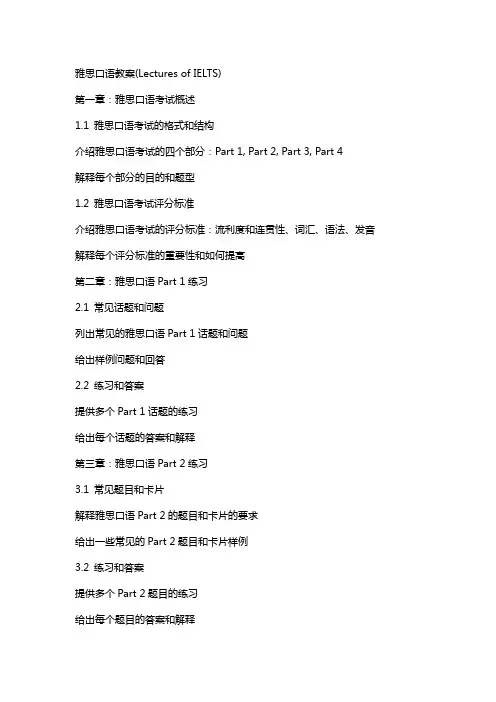
雅思口语教案(Lectures of IELTS)第一章:雅思口语考试概述1.1 雅思口语考试的格式和结构介绍雅思口语考试的四个部分:Part 1, Part 2, Part 3, Part 4解释每个部分的目的和题型1.2 雅思口语考试评分标准介绍雅思口语考试的评分标准:流利度和连贯性、词汇、语法、发音解释每个评分标准的重要性和如何提高第二章:雅思口语Part 1练习2.1 常见话题和问题列出常见的雅思口语Part 1话题和问题给出样例问题和回答2.2 练习和答案提供多个Part 1话题的练习给出每个话题的答案和解释第三章:雅思口语Part 2练习3.1 常见题目和卡片解释雅思口语Part 2的题目和卡片的要求给出一些常见的Part 2题目和卡片样例3.2 练习和答案提供多个Part 2题目的练习给出每个题目的答案和解释第四章:雅思口语Part 3练习4.1 题目和问题解释雅思口语Part 3的题目和问题给出一些常见的Part 3题目和问题样例4.2 练习和答案提供多个Part 3题目的练习给出每个题目的答案和解释第五章:雅思口语Part 4练习5.1 题目和问题解释雅思口语Part 4的题目和问题给出一些常见的Part 4题目和问题样例5.2 练习和答案提供多个Part 4题目的练习给出每个题目的答案和解释第六章:雅思口语Part 1深入分析与技巧提升6.1 针对不同类型的常见问题策略提供不同类型问题的回答策略,例如:个人信息、描述物体、谈论事件等给出实用的表达方式和过渡语6.2 提高流利度和连贯性的技巧介绍如何提高雅思口语的流利度和连贯性,例如:语音语调、节奏、断句等提供练习和实用技巧第七章:雅思口语Part 2深度练习与示范7.1 题目类型与示范详细介绍雅思口语Part 2的题目类型,如:人物、地点、物品、经历等提供各种题目的示范回答,并分析其优点和可借鉴之处7.2 个性化回答与展示技巧讲解如何为Part 2题目创造个性化回答介绍如何在回答中展示个人观点、情感和细节第八章:雅思口语Part 3应对策略与实战演练8.1 应对具体问题的策略提供针对雅思口语Part 3具体问题的应对策略分析问题类型,如:观点对比、原因分析、解决方案等,并提供回答模板8.2 实战演练与反馈设计多个Part 3题目进行实战演练提供反馈和建议,帮助学生提高应答能力第九章:雅思口语Part 4高效练习与解析9.1 题目类型与解析详细介绍雅思口语Part 4的题目类型,如:观点讨论、数据分析、趋势预测等分析题目要求,提供回答思路和表达方式9.2 高分答题技巧与练习讲解如何在Part 4中取得高分,如:使用丰富的词汇和语法结构、展示逻辑思维等提供多个Part 4题目的练习,并给出答案与解析第十章:雅思口语模拟测试与全面提升10.1 模拟测试与点评设计一套完整的雅思口语模拟测试,包括四个部分对学生的回答进行点评,提供改进意见和建议10.2 全面提升策略总结雅思口语考试的关键技巧和策略给出持续提高雅思口语水平的建议和资源推荐重点和难点解析1. 雅思口语考试概述难点解析:理解和掌握每个部分的评分标准,以及如何根据这些标准提高自己的口语能力。
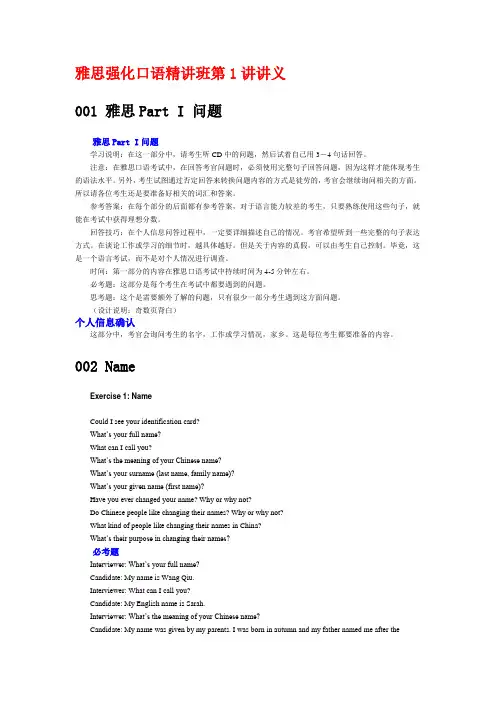
雅思强化口语精讲班第1讲讲义001 雅思Part I 问题雅思Part I问题学习说明:在这一部分中,请考生听CD中的问题,然后试着自己用3-4句话回答。
注意:在雅思口语考试中,在回答考官问题时,必须使用完整句子回答问题,因为这样才能体现考生的语法水平。
另外,考生试图通过否定回答来转换问题内容的方式是徒劳的,考官会继续询问相关的方面。
所以请各位考生还是要准备好相关的词汇和答案。
参考答案:在每个部分的后面都有参考答案,对于语言能力较差的考生,只要熟练使用这些句子,就能在考试中获得理想分数。
回答技巧:在个人信息问答过程中,一定要详细描述自己的情况。
考官希望听到一些完整的句子表达方式。
在谈论工作或学习的细节时,越具体越好。
但是关于内容的真假,可以由考生自己控制。
毕竟,这是一个语言考试,而不是对个人情况进行调查。
时间:第一部分的内容在雅思口语考试中持续时间为4-5分钟左右。
必考题:这部分是每个考生在考试中都要遇到的问题。
思考题:这个是需要额外了解的问题,只有很少一部分考生遇到这方面问题。
(设计说明:奇数页背白)个人信息确认这部分中,考官会询问考生的名字,工作或学习情况,家乡。
这是每位考生都要准备的内容。
002 NameExercise 1: NameCould I see your identification card?What’s your full name?What can I call you?What’s the meaning of your Chinese name?What’s your surname (last name, family name)?What’s your given name (first name)?Have you ever changed your name? Why or why not?Do Chinese people like changing their names? Why or why not?What kind of people like changing their names in China?What’s their purpose in changing their names?必考题Interviewer: What’s your full name?Candidate: My name is Wang Qiu.Interviewer: What can I call you?Candidate: My English name is Sarah.Interviewer: What’s the meaning of your Chinese name?Candidate: My name was given by my parents. I was born in autumn and my father named me after theseason.Interviewer: What’s your surname (last name, family name)?Candidate: Wang is my last name.Interviewer: What’s your given name (first name)?Candidate: Qiu is my first name.思考题Interviewer: Have you ever changed your name? Why or why not?Candidate: No, never. My name sounds ok, and there is no need for me to change it. Besides, it is too complicated to change a name in China. We have to go to the police station and change all our relevant documents.Interviewer: Do Chinese people like changing their names? Why or why not?Candidate: I guess not. According to us, our names are from our family tree or given by fortune-tellers. Our names can bring them good luck.Interviewer: What kind of people like changing their names in China? Why?Candidate: I guess some famous stars prefer to change their names because they believe that their new names are easy to be remembered.003 WorkingExercise 2: Working or Studying这部分中,工作的考生只需要准备工作的内容,上学的考生只准备关于学校的内容。
最权威的国际教育服务平台资料来源:教育优选 /雅思口语考试内容介绍雅思考试口语第一个部分:introduction and interview 部分introduction and interview 我们主要可以分为;两个部分解答:在开始的时候,考官会问你一些基本的问题,主要是一些关于身份的问题,可能会问你:名字是什么,看你的证件吗等等简单的问题,这个过程之后就会正式进入到这个所谓interview 的部分。
interview 的部分是关于基本的一些生活相关的问题的一些口语的交流,可能会问到关于你学业,你的生活,你的家乡,你的兴趣爱好这样方面的问题,这整个过程持续时间大约是四到五分钟的时间。
雅思考试口语第二部分:Personal long-turn 部分在这个部分,学生会拿到一张写着题目的纸张,这个题目主要是关于人,或者一个地方,或者是某件事情,还有一些提示性的问题。
根据这这个问题,雅思考试的考生会有一分钟的准备时间和两分钟的考试时间,考生要把这自己准备的一段话进行阐述,这段话的内容必须围绕刚刚给出的题目进行,也可以适当延伸一下。
雅思考试口语第三部分:Two-way discussion 部分这个部分和第一部分有类似的东西,主要是以问答的形式出现,考官会抛出一些问题,这些问题是和第二部分的内容比较相关的,涉及的主要层面是关于社会、自然、生态之类的,内容比第一部分相对深入很多,词汇量的要求也会大一些,这个持续时间是四五分钟的样子。
整场雅思考试口语部分会在十一到十四分钟之间,是所有考试时间里面最短的一个项目。
很多考生就会问,这么短的时间,考官如何检验出真正的水平呢?雅思考试的口试部分到底是怎么在评分的呢?接下来我们就说说所谓的口语考试的评分标准。
雅思考试口试部分的评分标准有这样的四项:A 、Fluency and coherence ,流利度和相关性B 、Lexical resource ,词汇量C 、Grammatical range and accuracy ,所谓的语法的范畴和我们的所谓的什么,准确度D 、Pronunciation ,发音。
Introduction of IELTS Specking Test雅思口语考试包括三部分内容:一般性话题(General Questions),专题讨论(Topics), 和深入性话题(Deep Questions). 雅思口语考试的目的是为了考查考生实际交流的能力,因此一般性话题总是放在开头部分。
雅思口语考试的过程如下:Part One: Introduction and Interview会面问话:主考官会鼓励,引导考生多谈一般话题,包括:生活,文化习惯,个人兴趣等等,约4-5 分钟。
考生应该勇敢积极发言。
Part Two: Long Turn卡片问题:主考官抽出一张写着话题的卡片(Cue Card),上面写明需要谈论的内容。
考生有1 分钟的时间准备,之后要连续2 分钟的独白,考官不会中途打断,直到时间停止,考官开始提问。
Part Three: Discussion深入讨论:该部分基本上是对第二部分的谈话内容进行比较广泛而深入的讨论,约4-5 分钟。
这些问题一般比较抽象,考生一定要主动大胆的回答考官的提问。
雅思口语评分:雅思考试采用国际认可的9 分制评分系统,总分可为半分或整数分。
中国大部分学生的主要分数线为5-6 分测评标准:流利度(Fluency and coherence)发音(Pronunciation )词汇(Vocabulary)语法(Grammar)雅思口语评分三级跳“草根版”评准。
准,到底怎样到达?以下为分标评雅思口语的四项分标5 分6 分7 分Fluency 流利度句子中常常出现不必速比较自然,只出完整的句语能说有同学子,但是每隔几句一在很少的地方由于思要的停顿,还习惯用“er⋯”“a h⋯”了不必要定会有不连贯的地考答案出现出这f illers, 甚至中间较长的停顿方。
有可能出现时间的令人尴尬的停。
现长说时间没有话另外一个极端就是无顿,但是次数不多出来,完全敌流利喷没有喘气,睁眼,甚至中文都达不到的灵异境界,只能被考官为是在背书。
环球雅思口语试讲环球雅思口语试讲Introduction:Hello everyone, my name is [Your Name] and I will be your speaker today for this Global IELTS Speaking Test. Today, I will be guiding you through the four sections of the IELTS Speaking Test, which are the Introduction, Individual Long Turn, Two-way Discussion, and the Conclusion. Let's start with the Introduction.Section 1: IntroductionIn this section, the examiner will ask you some questions about yourself, your interests, and your background. The purpose of this section is to assess your ability to provide personal information and speak about familiar topics.Examiner: Good morning/afternoon. Can you please introduce yourself and tell me a little bit about your background?Candidate: Good morning/afternoon. My name is [Your Name]. I am [age] years old, and I come from [city/country]. I recently graduated from [university/college] with a degree in [field of study]. I am currently working as a [job position] and I have been preparing for the IELTS test for a few months now.Examiner: That's great. Now, let's move on to some questions about your interests. Can you tell me about your favorite hobby? Candidate: Sure. One of my favorite hobbies is playing the guitar. I have been playing the guitar for about five years now. I find it agreat way to relax and express myself creatively. I enjoy playing different genres of music, from classical to rock. I believe that playing an instrument is not only a hobby, but also a form of self-expression.Examiner: That's interesting. So, do you play the guitar alone or do you perform in front of an audience?Candidate: I usually play the guitar alone in my free time, but I have also performed in front of small audiences. I have participated in a few talent shows and open mic nights at local cafes. It was a bit nerve-wracking at first, but it was a great experience to share my passion for music with others.Section 2: Individual Long TurnIn this section, you will be given a task card with a topic, and you will have one minute to prepare your response. After that, you will have to speak about the topic for one to two minutes. The purpose of this section is to assess your ability to speak fluently, coherently, and confidently on a given topic.Examiner: Now, I will give you a topic and you will have one minute to prepare your response. Here is your task card: Describe a memorable trip you have been on. You should say:- Where did you go?- Who did you go with?- What did you do during the trip?- Explain why it was memorable to you.Candidate: Thank you. Well, one of the most memorable trips I have been on was my visit to Japan last year. I went there with my family during the summer vacation. We visited several cities, but the highlight of the trip was our visit to Tokyo. We spent a week exploring the city and experiencing its vibrant culture.During our stay in Tokyo, we visited famous landmarks such as the Tokyo Tower and the Meiji Shrine. We also explored the bustling markets and tried various local foods, such as sushi and ramen. We took part in a traditional tea ceremony and even wore kimono for a day. The experience was truly immersive and gave us a deeper insight into the Japanese culture.What made this trip memorable to me was the unique blend of traditional and modern aspects of Japanese culture. It was fascinating to see how the city seamlessly combined ancient temples and shrines with futuristic technology and skyscrapers. The people were also incredibly welcoming and friendly, which made our stay even more enjoyable. Overall, the trip to Japan was a once-in-a-lifetime experience that I will cherish forever. Section 3: Two-way DiscussionIn this section, the examiner will engage in a discussion with you on a particular topic related to the theme of the previous section. The purpose of this section is to assess your ability to express and justify opinions, analyze information, and engage in a meaningful conversation.Examiner: Now, let's move on to the two-way discussion. We will continue talking about travel. What are the advantages anddisadvantages of traveling to foreign countries?Candidate: There are several advantages of traveling to foreign countries. Firstly, it allows us to experience different cultures and broaden our horizons. We can learn about the customs, traditions, and history of another country, which helps us develop a greater appreciation for diversity. Secondly, traveling to foreign countries enables us to gain new perspectives and challenge our preconceived notions. It opens our minds to different ways of thinking and helps us become more tolerant and understanding. On the other hand, there are also disadvantages to traveling abroad. One of the main disadvantages is the cost. Traveling to foreign countries can be quite expensive, especially when considering accommodation, transportation, and meals. Additionally, language barriers and cultural differences can pose challenges, especially for those who are not familiar with the local language or customs.Examiner: That's very true. Now, let's talk about sustainable tourism. What measures can be taken to promote sustainable tourism?Candidate: Sustainable tourism is becoming increasingly important in today's world. One of the key measures that can be taken to promote sustainable tourism is raising awareness among tourists and local communities. Educating tourists about the environmental and social impacts of their actions can help them make more sustainable choices. For example, encouraging them to use public transportation instead of private vehicles or to choose eco-friendly accommodations. Another measure is promoting responsible tourism practices, such as minimizing waste, conserving water andenergy, and supporting local businesses. Governments and tourism organizations can also implement regulations and policies to ensure sustainable tourism practices are followed. For instance, limiting the number of tourists in sensitive areas or implementing waste management policies. Overall, promoting sustainable tourism requires a collaborative effort from all stakeholders involved.Section 4: ConclusionIn this section, you will be given an opportunity to summarize and conclude the discussion. The purpose of this section is to assess your ability to summarize information, express a clear opinion, and make conclusions based on the previous sections.Examiner: Thank you for your insightful responses. Now, let's move on to the conclusion. Based on our discussion today, what are your thoughts on the importance of learning about different cultures?Candidate: Learning about different cultures is of utmost importance in today's interconnected world. It helps us foster a sense of global citizenship, understanding, and respect for others. By gaining knowledge about different cultures, we can break down stereotypes and build bridges of understanding. It also enables us to adapt and thrive in diverse environments, which is increasingly important in our multicultural societies. Learning about different cultures not only enriches our personal experiences but also cultivates a more inclusive and harmonious global community. Examiner: Thank you for your excellent response. That concludesour IELTS Speaking Test. Well done!Candidate: Thank you. It was a pleasure participating in this Global IELTS Speaking Test.。